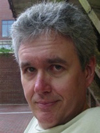|
|
|
| P R I N T E R - F R I E N D L Y F O R M A T | Return to Article |
D-Lib Magazine
November/December 2010
Volume 16, Number 11/12
Preliminary Report on the 2010-2011 DigCCurr Professional Institute: Curation Practices for the Digital Object Lifecycle
Kaitlin Light Costello and Michael E. Brown
University of North Carolina at Chapel Hill, School of Library and Information Science
{kaitcost, brownmeb}@email.unc.edu
doi:10.1045/november2010-costello
Abstract
DigCCurr II: Extending an International Digital Curation Curriculum to Doctoral Students and Practitioners hosted the first session of the second Professional Institute at the University of North Carolina at Chapel Hill from May 17-21, 2010. The Institute, taught by international digital curation experts, is designed to foster skills, knowledge, and community-building among professionals responsible for the curation of digital materials. It includes a week-long component, online interaction and support, and a two-day in-person follow-up session to be held January 5-6, 2011. This preliminary report discusses the week-long session of the second of three Professional Institutes.
Summary of summer session
The summer session of the 2010-2011 DigCCurr Professional Institute was held at the University of North Carolina at Chapel Hill from May 17th through May 22nd, 2010. It was the second of three Professional Institutes organized by DigCurr II, which is funded by the Institute of Museum and Library Services (IMLS). One of the primary goals of DigCCurr II is to build an international community of digital curation practitioners. To support this goal, we offer three annual, multi-stage training institutes for professionals responsible for managing digital collections.
The DigCCurr Professional Institute has a unique structure: first, participants attend a week-long summer session of lectures, group discussions, and hands-on lab exercises relevant to their specific curation needs. At the end of the week, participants develop six-month action plans defining what technologies, procedures, and initiatives they would like to adopt. At the end of the six months, participants return for a two-day follow-up winter session in January, where they discuss their experiences and share the results of their work.
Thirty three practitioners from a variety of institutions, including academic libraries and archives, non-profit consortiums and corporations, government archives, and public libraries, convened in Chapel Hill, North Carolina at the end of May 2010 for the summer portion of the second DigCCurr Professional Institute. Twelve of the attendees were supported by the Council on Library and Information Resources and came from small- to mid-sized academic institutions with limited resources to train library staff on digital curation. Their presence enhanced the diversity of the attendees and helped bridge the gap between small and large institutions, allowing both to be well-represented at the Institute. This mix of attendees addressed one of the Institute's goals: to provide an opportunity for attendees to meet face-to-face and help build a digital curation community.
Seven experts in digital curation led presentations and conducted lab exercises at the Institute, including doctoral candidate Carolyn Hank, Dr. Cal Lee, Dr. Helen Tibbo, and Dr. Richard Marciano from the School of Information and Library Science at the University of North Carolina at Chapel Hill; Dr. Nancy McGovern from the University of Michigan's Interuniversity Consortium for Political and Social Research (ICPSR); Dr. Seamus Ross, from the iSchool at the University of Toronto; and Dr. Manfred Thaller, from the University of Cologne. The week-long component consisted of five days of 24 presentations, group discussions, and hands-on lab exercises; topics covered included file formats and forensics, policy and management, curation technologies, and user access and interfaces. Highlights of the presentations and lab exercises follow.
File formats and forensics
Dr. Manfred Thaller presented an overview of PLANETS, a four-year research and technology development project designed to address core digital preservation challenges, with funding from the European Union. He also led a hands-on exercise with a software utility which flips bits randomly in various types of files. The participants ran the utility and then attempted to open the files in order to assess what damage was inflicted and how the damage impacted the files. This led to discussions on authenticity and significant properties for preservation.
Dr. Cal Lee led a session on applying digital forensics to digital curation, and discussed detaching bits from their physical media. To care responsibly for digital collections over time, one must intervene to prevent bits from becoming unreadable or corrupted, and curators must know more about the underlying technology than typical end-users. Dr. Lee's lecture was followed by a lab exercise in which participants were given a collection of files in folders. They then attempted to glean information about the files given their location in the directory hierarchy, filenames (some files were mislabeled or unlabeled), hash values, and their contents as viewed through hex editors.
Policy and Management
Carolyn Hank discussed defining submission agreements that are derived from a repository's overall policies. This session drew on examples from a variety of digital repository types to provide an overview of submission agreement forms which are framed by the technical, legal, and workflow issues to be considered when developing and operationalizing submission agreements. She concluded with a lab exercise where participants identified what polices they had in place at their institutions and which policies were lacking or not yet formed.
Dr. Seamus Ross presented on managing risk and uncertainty, and the implications of risk for engendering trust in repositories. This was followed by an exercise created by DigCCurr doctoral fellow Sarah Ramdeen in which participants used the Digital Repository Audit Method Based on Risk Assessment (DRAMBORA) Interactive system to understand risks and develop mitigation strategies for those risks.
Curation technologies
Dr. Richard Marciano lectured on the importance of infrastructure independence, and discussed why infrastructure independence is an essential component of digital curation. He focused on data grids and their ability to preserve records independent of underlying technology, as well as how infrastructure independence can enable the use of cutting-edge technologies. Chien-Yi Hou, a Research Associate at UNC, also made important contributions to the Institute through a presentation that he gave with Richard Marciano about work to automate digital curation workflows.
Dr. Cal Lee and Dr. Richard Marciano co-instructed a session on strategies for writing policies that can be expressed as rules, and rules that can be automatically executed. This lecture covered the advantages of translating policies into machine-actionable rules, and how rules can be developed to verify and audit enactment of other rules. They also discussed the basics of breaking rules down into atomic components. This presentation was followed by a hands-on exercise which re-used the risks identified in the earlier DRAMBORA lab; here, groups deconstructed policies into actionable rules, and they also identified policies that would need to be revised in order to convert them to machine-actionable rules.
User access and interfaces
Dr. Nancy McGovern and Dr. Helen Tibbo chaired a session on the importance of conducting research on digital collection needs. This presentation emphasized how to evaluate repository use critically in order to best serve the needs of users. Their lecture was followed by an exercise in Web analytics, designed to introduce participants to popular analytics packages and to allow them to become familiar with what types of reports and metrics they produce.
Final product from the Institute summer session
At the end of the week, each participant formulated an action plan incorporating the concepts covered during the Institute for the six months following the summer session. Instructors were available to provide guidance and instruction while participants created these action plans. Participants then posted these plans online to get feedback from the instructors, DigCCurr II doctoral fellows, and the other attendees.
Interim period
During the interval between the summer and winter sessions, participants are encouraged to implement the ideas and concepts discussed in the lectures and practiced in the labs. The Digital Curation Exchange provides an online venue for participants to convene and share notes on their progress, setbacks, questions, and comments. Institute instructors and DigCCurr II doctoral fellows monitor the site, addressing questions and concerns from participants; participants also comment on one another's posts. The Digital Curation Exchange is a vital part of the Institute experience, although attendees from the 2009 Institute also reported using e-mail, Twitter, Skype, wikis, and other forms of social media to stay in touch and connect with one another after the week-long intensive Institute took place. According to posts on the Digital Curation Exchange and e-mail correspondence between the DigCCurr doctoral fellows and participants, several Institute attendees have made considerable progress on their work since the summer session. Highlights from individual participants include the development of faculty instruction seminars on research data management, deployment of ingest tools, launching pilot projects to test tools for curation services, and the development of a team and project charter for inter-university collaboration.Winter session of Institute
The winter session of the 2010-2011 Institute is scheduled for January 5-6, 2011. Participants will return to the University of North Carolina at Chapel Hill to report on their progress. Most of the instructors will return for the winter session, and the four DigCCurr doctoral fellows will also participate as presenters and facilitators during the event. Participants will be encouraged to discuss problems they encountered in implementing their plans, how they overcame those problems, and the software and tools they used to enact their goals. During the meeting, participants will also be placed in groups based on the topics of their projects; this will facilitate inter-institutional networking among individuals. These group discussions may also result in collaborations on future work, which was an outcome of the winter session of the 2009-2010 Institute.
During the winter session, participants will develop a second six-month plan. This plan will build on the goals met during the last six months, providing participants with future actions and intended outcomes. We will also ask the participants to file a twelve-month report summarizing their activities and accomplishments made during the year after their participation in the DigCCurr Professional Institute.
Future Professional Institutes
The final DigCCurr Professional Institute will be held in Chapel Hill at the University of North Carolina from May 16th through May 20th, 2011 and January 4-5, 2012. Pre- and post-Institute surveys are conducted for both the summer and winter sessions in order to shape the content and format of future Institutes. The 2011-2012 Institute, which will consist of many of the same instructors and general topics, is likely to contain some different instructional sessions and hands-on lab exercises.
Information about the upcoming 2011-2012 DigCCurr Professional Institute is available on the DigCCurr II website at http://ils.unc.edu/digccurr.
About the Authors
 |
Kaitlin Light Costello is a Carolina Digital Curation Doctoral Fellow and the Project Manager for DigCCurr II at the School of Information and Library Science at the University of North Carolina at Chapel Hill. She obtained her bachelor's degree from Vassar College, and holds a M.Sc. in library and information science with a certificate in special collections from the University of Illinois at Urbana-Champaign. Kaitlin's research interests include digital curation, personal health records, and social media. Follow her at http://twitter.com/k8lin. |
 |
Michael E. Brown graduated with a BA in English from NC State University in 1983 and has since worked as a reporter, public information writer, and, since 1989, as a technical writer in North Carolina's Research Triangle Park. He is currently completing a master's degree in information science at the University of North Carolina in Chapel Hill's School of Information and Library Science (SILS). |
|
|
|
| P R I N T E R - F R I E N D L Y F O R M A T | Return to Article |